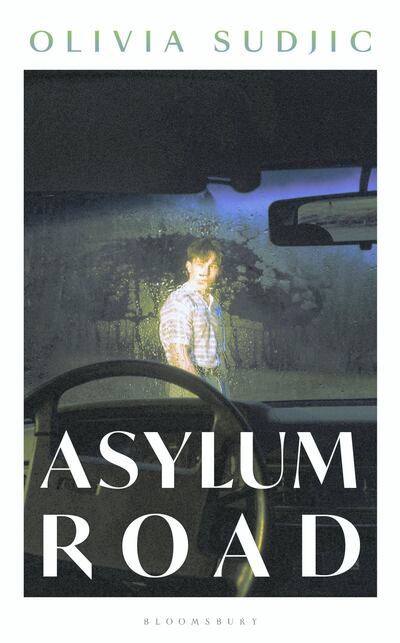As a child in 1990s London, Olivia Sudjic grew up with a little more awareness of the conflicts in the former Yugoslavia than most of her friends. It’s where her grandparents were from, and she remembers being intrigued by the notion of a civil war.
“I couldn’t understand the phrase; how a war could be civil,” she says. “I went to Montenegro for my grandfather’s funeral and had this real sense of: ‘Goodness, I’ve been listening to Michael Jackson and the Spice Girls, having this normal life, but if my grandparents hadn’t left, the civil war could have been my childhood.’ That idea of chance and luck stuck with me.”
The idea of seemingly civilised places and people "sleepwalking into disaster", as Sudjic puts it, is at the heart of her second novel, Asylum Road. Sudjic, who admits she's a pessimist, found herself feeling incredibly anxious about the world, and began to explore a couple's uncommunicative relationship that begins, in the book, with … a marriage proposal.
“I didn’t know then that these two people would represent bigger ideas about the way humanity works right now,” she admits. “But then, Trump and Brexit happened, and it was really interesting watching people suddenly realise that there was this whole other way of seeing the world that hadn’t been obvious to them. So I really liked the idea of trying to explore in a very intimate relationship how people can be misunderstood, but also how those misunderstandings become normalised over time.”
So Asylum Road begins with Anya and Luke on a seemingly idyllic holiday, navigating a slightly awkward relationship that seems at a turning point. Anya is a fantastic narrator; uneasy, sharply – sometimes comically – perceptive yet never quite trustworthy. So paranoid, too, that she mistakes the big setpiece moment where the reserved Luke will pop the question, with the "talk", where he will break things off. She feels a "peculiar foreboding" when forced to consider being married to Luke, but at the same time wants the institution of marriage."Anya will always choose a form of safety over any kind of individual freedom or self-direction," says Sudjic. "That tension between security and personal freedom made me think a lot about who we are as people when the social contract is taken away. I don't have an answer to that, but I did want to offer that question of whether underneath we are these brutish people who will do anything to survive."
The brutishness comes, in part, from playing with the stereotype of Balkan men. But Asylum Road wears such weighty themes remarkably lightly, largely because there's an obvious reason for Anya's unease in what seems like her otherwise privileged life; she was sent to Scotland to live with an aunt during the Balkan war, leaving behind a brother who later killed himself.
When she takes Luke back to Sarajevo in the present day to meet her remaining family, it only serves to compound her feelings of being unwelcome in her own home, wherever that home might be. These ideas about dislocation, identity and living as an outsider feel piercingly authentic.
"Obviously, I've not experienced being a refugee or an asylum seeker, but I do have experience of feeling unwelcome," says Sudjic, perhaps a reference to how she's said previously that her surname sometimes made her feel self-conscious at school.
“There’s this idea with being a migrant that you’re supposed to be happy and grateful that you’re now in a safe place – rather than feeling like you’re in a kind of exile, where your life is much more random and lacks a narrative shape.”
Sudjic has enjoyed much more security in her own life, but admits that she didn’t want to know or had felt some resistance to thinking about the Balkans in the past. “Why didn’t I want to claim it?” she asks of herself.
“I went through this general process of asking whether I was just part of this awful middle-class elite, totally out of touch. It was a self-examination that got me thinking that the civil war, which happened in the Balkans, always seems to happen somewhere else – until it doesn’t.
“People in the Balkans were depicted as being part of this tribal, barbaric war, but this was Europe. When I was there in the 1990s, they had learnt English perfectly from the same films I watched, the cultural references were the same, and yet I felt like I’d thought of them as living 50 years in the past somehow.”
The dangers of thinking "it couldn't happen here" was brought into sharp focus for Sudjic in the past few weeks when pro-Trump supporters stormed the Capitol Building in Washington. Sudjic thinks the complacency of the response to the pandemic in the UK is part of the same idea. "We were so unprepared because people don't want to have to face this kind of thing, we don't want to have to prepare or face up to the worst."
Indeed, the only way Asylum Road could have felt more urgently current is if it had somehow ended in a pandemic. But the lack of Covid, Brexit finally "happening" or Biden winning the presidency does not date Sudjic's book; rather, in lockdown her ideas about the way society, states and people operate actually make more sense. It asks why nostalgic taglines such as "take back control" or "make America great again" have such a compelling hold over people.
And even though Anya unravels still further when she returns "home" from Sarajevo, there's a defiance to her actions in the unexpectedly shocking denouement. "She is in control in that moment – but also not in control at all," says Sudjic. "Which I think we can all understand in some way right now; this weird disjunct between everyday life and this terrifying thing that's happening all around us."


